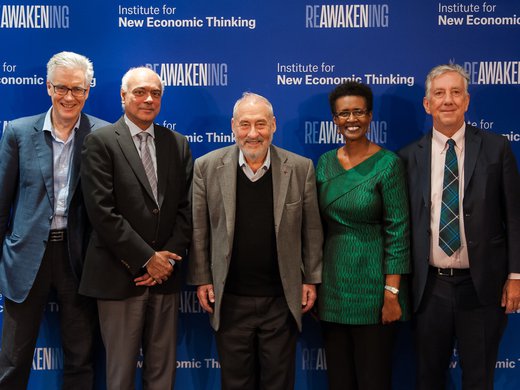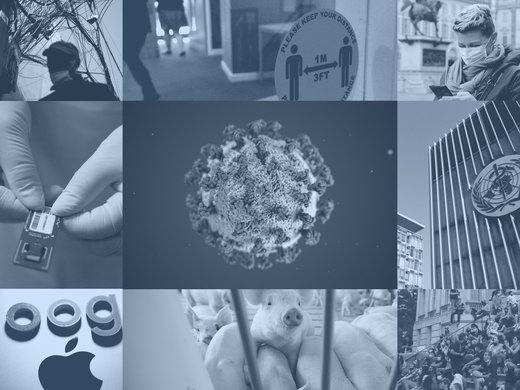March 11, 2021 (New York, NY) – A new report from INET’s Commission on Global Economic Transformation responds to the COVID-19 pandemic and economic crisis, and the particularly adverse effects it has had on many in the developing world. The report calls for urgent action to ensure the supply of vaccines and other medicines, debt relief, and enhanced fiscal capacity for the Global South, especially through the issuance of special drawing rights (SDRs) by the International Monetary Fund (IMF).
“Too many national and international policies are going directly against the minimum required to end the pandemic, enable global economic recovery, and get back on track for the UN's Sustainable Development Goals,” said Jayati Ghosh, professor of economics at the University of Massachusetts Amherst. “We propose some simple and achievable steps that can be taken quickly to reverse course for a better future. All that is needed is political will and recognition of the urgency.”
Joseph Stiglitz observed that the world won’t be free from COVID-19 until the pandemic is controlled everywhere, and that the world won’t have a robust recovery from the pandemic downturn until there is a recovery everywhere. Helping those in the developing world is thus not just a moral issue; it is in the self-interest of the advanced countries. The benefit-cost ratio for doing more is enormous.
The report, Interim Report on the Global Response to the Pandemic, authored by members of INET’s Commission on Global Economic Transformation (CGET), which includes business leaders, economists, and former public officials, calls for:
- Actions that ensure access to vaccines and other critical medicines, including ensuring that intellectual property rights do not act as a barrier to access;
- A massive issuance of Special Drawing Rights (SDRs, the international liquidity that the IMF can create), which would give countries the resources they need, but don’t have, to rejuvenate their economy—accompanied by measures to ensure that all developing countries have the fiscal space to expand the quantity and quality of public service provision;
- Comprehensive debt restructuring (including both the public and private sectors) for the many countries that have become over-indebted. This has to go well beyond the G-20 initiative concerning stays in debt payments and include actions to encourage private sector participation. The Report notes that if there ever was a time for principles such as “force majeure” and “necessity” (under which previously signed contracts are not enforced) this is it.
While the interim report discusses the actions that have to be taken urgently, it sets the stage for the CGET’S full report, which will be issued later this year. The full report will address longer term issues, including the need for an international framework for sovereign debt restructuring and a better framework for intellectual property rights.
"Extraordinary times call for extraordinary measures. Failing bold action, developing countries could be on track to lose years or even decades of progress in the post-pandemic world," said CGET co-chair Michael Spence.
"The COVID-19 pandemic has brought to the forefront longstanding gaps in global governance,” said Rohinton P. Medhora, president of the Centre for International Governance Innovation and member of INET’s global commission. “In this report, we address three key areas – vaccine development and roll-out; economic policies for recovery; and debt management. Having orderly and equitable global processes in these areas is essential to serve us well now and in the future.”
Following the dramatic political shocks to the industrialized world in 2016, worsening global poverty and inequality, and inadequate public and private sector responses to the challenges that continue to plague the world’s economy 10 years after the financial crisis INET initiated a Commission on Global Economic Transformation, with support from the Centre for International Governance Innovation (CIGI).
"With this interim report from the Globalization Subcommittee, which recommends immediate policy innovations in response to the economic crisis the pandemic has provoked for the developing world, the CGET puts forth the first in a series of transformational changes to the world system that are needed to address the daunting challenges that humankind now faces,” said INET president Rob Johnson.
For media inquiries, contact INET's VP of Communications Sharmini Peries at [email protected] or +1 (310) 384-9947.
- 30 -
About the Institue for New Economic Thinking:
The Institute for New Economic Thinking (INET) is a nonpartisan, nonprofit organization devoted to developing and sharing the ideas that can repair our broken economy and create a more equal, prosperous, and just society. We conduct and commission research, convene forums for exchanging ideas, develop curricula and nurture a global community of young scholars to meet current and future challenges.


